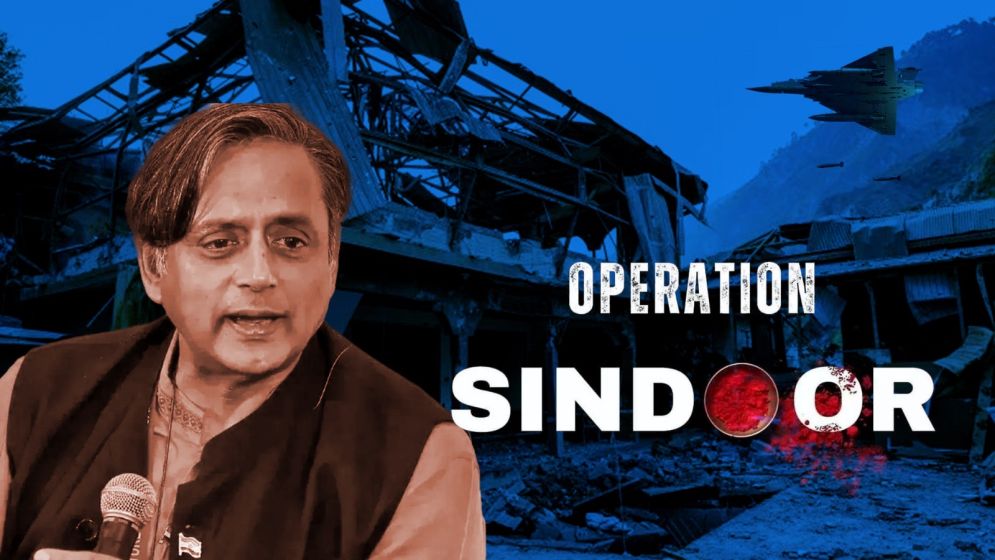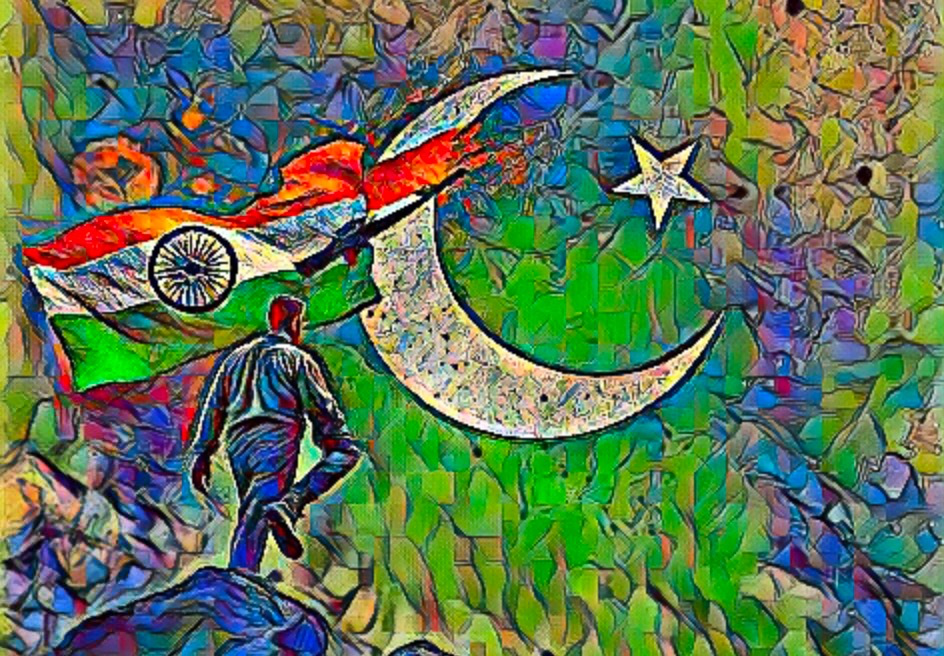Shashi Tharoor’s glossy defense of Operation Sindoor can’t cover the cracks

In the age of hyper-partisan primetime television, few orators are as skilled at navigating the storm as Shashi Tharoor.
Articulate, erudite, and disarmingly poised, Tharoor has emerged as a leading voice defending India’s May 7 missile strike on Pakistan–Operation Sindoor–with words like “measured,” “professional,” and “responsible.”
But eloquence should not be mistaken for evidence, and behind the diplomatic varnish lies a troubling reality.
According to Tharoor, the barrage of 24 missiles launched across the border was “non-escalatory”--a term that strains credibility. Since when is the unilateral use of force against a sovereign state, absent United Nations oversight or publicly available intelligence, a model of restraint?
Military operations of this magnitude demand transparency and scrutiny, not applause for circumvention.
Tharoor further asserts that India’s avoidance of direct strikes on Pakistani military targets was an act of calculated restraint. Yet, open-source tracking and preliminary reports tell a different story: Indian jets, including Rafales, were reportedly engaged by Pakistani defenses, with as many as five aircraft allegedly downed.
That’s not a clean operation. That’s a night of high-risk confrontation ending in over a billion dollars in military losses–within Indian airspace.
Restraint is not the word that comes to mind. Damage control, perhaps.
He also points to the timing of the strike–between 1:15 and 1:30 a.m.--as evidence of an effort to minimize civilian harm. It is a claim that collapses under the weight of the casualties: 26 civilians killed in Bahawalpur, among them children as young as three.
Many were praying in a mosque. If Indian intelligence was accurate enough to target nine terror camps, how did it miss a place of worship teeming with civilians?
This either reflects a catastrophic intelligence failure or a troubling disregard for noncombatants. Neither option squares with Tharoor’s narrative of professionalism.
The silence surrounding the aftermath is just as telling.
Multiple crashes of Indian aircraft–in Srinagar, Pampore, and Bathinda–have gone unacknowledged by official channels. In a democratic society, accountability should not be subordinate to optics.
A government that buries its setbacks beneath nationalist sentiment is not projecting strength; it is concealing weakness.

Vaguely worded explanation
To bolster India’s case, Tharoor points to statements of support from France, Russia, and Israel. But geopolitical interests are not moral endorsements.
France, facing scrutiny over its Rafale jets, is understandably eager to protect its defense exports. Russia continues to arm both India and Pakistan–its neutrality is transactional, not principled. And Israel’s backing, as ever, is deeply entwined with its own defense contracts and regional calculations.
Former President Trump called the strike “a shame.” China, Pakistan’s closest strategic ally, chose its words carefully–calling for restraint, not offering support.
The United Nations, notably, withheld any endorsement. And while New Delhi insisted the strike was precise and surgical, international human rights monitors and independent journalists were already on the ground in Bahawalpur, documenting scenes of civilian devastation.
Perhaps the most telling silence, however, comes from India itself.
The Pahalgam attack–cited as the casus belli for the strike–has yet to be formally referred to the United Nations for investigation. No resolution, no international tribunal, no request for impartial inquiry.
That absence isn’t just bureaucratic oversight; it’s a political choice. If a missile strike can be justified without transparency, what incentive remains to seek verification at all?
This is where Tharoor’s defense unravels further. He argues that India must meet a high evidentiary threshold before pursuing sanctions against Pakistani officials. And yet, that standard was curiously absent when India opted to fire missiles across an international border.
If smoking-gun evidence were truly the benchmark, Operation Sindoor would never have been authorized. No such evidence has been presented to date.
No satellite imagery. No intercepted communications. No verifiable chain of custody linking the Pahalgam attack to Pakistan’s military or intelligence services.
What we’ve seen instead is a familiar playbook of rhetorical escalation, built not on new intelligence, but on old fears.
Tharoor invokes the names of Osama bin Laden and Ajmal Kasab–evoking the trauma of Abbottabad and Mumbai’s 26/11 attacks. But these are not interchangeable with the present moment.
Bin Laden was discovered on Pakistani soil after a global manhunt. Kasab was captured alive in India, his role indisputable.
Those episodes carried their own grim clarity. But the past cannot be a license for perpetual reprisal. Historical pain does not confer present-day impunity.
In contrast, Pakistan–at least in optics–has taken a more measured approach. It opened blast sites to foreign journalists, issued calls for international investigation, and refrained from retaliating against Indian civilian centers.
India, meanwhile, closed ranks: barring press access, declining to acknowledge downed aircraft, and clinging to the narrative of a “measured” response even as images of child victims surfaced from Bahawalpur’s rubble.

Indian needs to come clean
If India aspires to global leadership, it must rise above the expediencies of power politics. Legitimacy isn’t earned through military spectacle or the silence of complicit allies. It is built on process, on principle, on proof.
A state that demands accountability from others must be willing to accept it for itself.
Anything less is not moral clarity. It’s choreography.
Tharoor concludes his defense by praising the Congress Party for being the first to endorse the strike, presenting it as a rare moment of national unity. But let’s be honest: this was not unity. It was acquiescence.
When the opposition begins to echo the ruling party’s rhetoric—celebrating military action without demanding evidence, ignoring civilian casualties, and sidestepping serious ethical concerns–it forfeits its role as a check on power.
The choreography extended to the government’s press briefing, carefully staged to project inclusivity.
A Kashmiri Pandit foreign secretary stood flanked by two women, one of them a Muslim officer, in what was clearly intended as visual proof of secularism. The message: this is not a Hindu-Muslim issue.
But symbolism cannot erase impact. When missiles flatten a mosque in Bahawalpur, when children die in their sleep beneath its dome, no amount of representational diversity at a podium can undo that reality.
You don’t kill Muslims in a place of worship and then point to a Muslim officer on camera to declare moral equilibrium. That’s not pluralism–it’s propaganda with a human face.
Pakistan, for all its flaws, has notably not framed this episode as a religious conflict. That framing came from New Delhi’s performance–the imagery, the rhetoric, and the carefully orchestrated optics.
And while it was Modi’s government that authorized the strike, the Congress Party followed dutifully behind, like extras in a nationalist production staged for maximum domestic applause.
This, perhaps, is the deeper crisis India now faces. Not merely one of governance, but of opposition. When no major political voice stands apart—when every party salutes in unison–who will ask the necessary questions? Who will demand restraint, law, and truth?
Operation Sindoor was not a triumph of strategy. It was a spectacle of force, launched without public evidence, conducted with questionable precision, and justified through tokenistic gestures and political pageantry.
No amount of eloquent rhetoric–however artfully delivered–can undo the facts on the ground, or the silence surrounding them.
If India truly seeks the stature of a responsible global power, it must reject the easy allure of bravado masquerading as strength. Real leadership demands more than unity in applause–it demands the courage to dissent when it matters most.
—
Arif Hafiz is a political analyst, cultural critic, and independent columnist.

